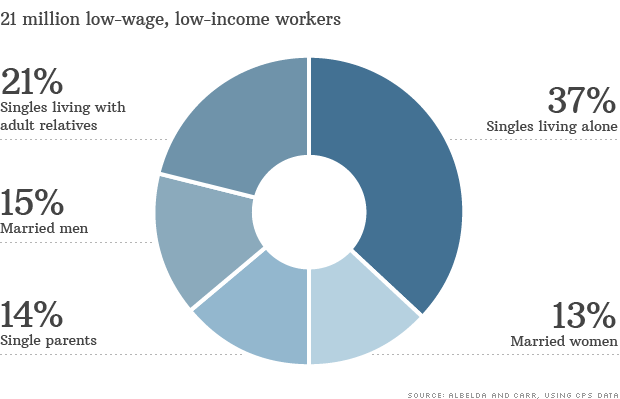 (Source: CNNMoney)
(Source: CNNMoney)
The Republicans are giddy after the Congressional Budget Office (CBO) issued a new report suggesting as many as 1 million jobs might be lost if the federal minimum wages goes from $7.25 per hour to $10.10, as proposed by President Barack Obama. Indeed, that sounds like a lot. Why focus on wages when perhaps a better way to improve Americans’ paychecks is to, first of all, not punish their employers, as the Republicans say, and instead focus on speeding up growth?
| About 21 million Americans are “low-wage breadwinners,” a 94 percent increase over the last 30 years. These are people whose households depend on that minimum wage check. |
Before the Republicans start high-fiving each other, let’s keep in mind this president doesn’t disagree on maintaining a pro-growth agenda. Even as he lamented inequality as the “defining challenge of our time” last year, he stressed that there is only so much government can do about it: “If you’re a progressive and you want to help the middle class and the working poor, you’ve still got to be concerned about competitiveness and productivity and business confidence that spurs private sector investment.” The temptation among partisans is to bicker over the details, but we should keep in mind that Democrats and Republicans generally agree on the concepts.
Another thing to keep mind is the effect of what’s being proposed. For those of us who don’t earn the minimum wage, it’s hard to imagine living on it. So let’s put $10.10 an hour in context. According to the Social Security Administration, about 81 million Americans earn less than $27,519 a year. That’s an astoundingly meager paycheck, but you wouldn’t make even that if you worked 40 hours a week for $10.10 a hour. You’d only make—before taxes—about $21,000. Despite working, you’d be living under the poverty line of $23,850.
And that’s if your employer obeys the law. The restaurant industry is notorious for stealing from its workers, according to Saru Jayaraman, head of ROC United, an advocacy group. She noted in the Spectator that 84 percent of business owners violate laws protecting wages originating from tips. She wrote that when Philadelphia was about to outlaw the widespread practice of deducting credit-card processing fees from tips, a prominent business owner unintentionally admitted he’d been skimming $500,000 a year from employees.
No discussion of minimum wage furthermore is complete without including the hiring-and-firing power of near-monopolies like Walmart, according to Polly Cleveland, an economist who teaches at Columbia University. Because it employs legions of minimum-wage workers, Walmart can skew what economists call the “wage range”—that’s the metric used to measure the real impact of the minimum wage on the economy. All things being equal, raising the minimum wage would have either no effect on jobs or it would increase the numbers of jobs, because more people would have more money in their pockets thanks to a higher federal minimum wage. But as the minimum wage goes up, Walmart can actually push down the wage range by letting people go and forcing the remainder to work overtime or not at all. The only way to push back against Walmart’s monopolistic advantage, Cleveland argued in the Spectator, is “to set a minimum wage even higher than the top of that range, higher than that suggested by the efficiency wage hypothesis.”
How much higher? “Maybe much higher.”
Of course, there’s enough tetchiness right now over $10.10, and the CBO report isn’t helping. In suggesting that job losses may amount to as many as 1 million to as few as zero, the report is hardly casting illumination of the debate. Yet what’s important to remember is that real people will be taking home real wage increases if Congress says yes.
And these people, it turns out, are not just teenagers working for ‘mad money’ or retirees supplementing their Social Security checks. According to a new study by University of Massachusetts-Boston economists Randy Albelda and Michael Carr, about 21 million Americans are “low-wage breadwinners,” a 94 percent increase over the last 30 years.
These are people whose households depend on that minimum wage check.
It’s time to give them a raise.
John Stoehr is the managing editor of The Washington Spectator. He wrote this for International Business Times.



0 Comments